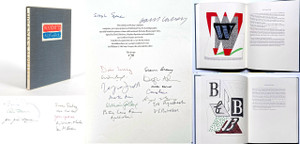
David Hockney
Rake's Progress Bedlam Cufflinks, 2020
Hand painted using special enamel paints and finished with 18ct gold plate for a luxury finish in bespoke box
Not signed
1 in diameter
Original David Hockney designs from the 1975 production of opera The Rake's Progress.
Inspired by an original recording conducted by Igor Stravinsky and William Hogarth's series of eight paintings and engravings of the same name, Hockney began designing the set and costumes production of The Rake's Progress. Through his designs and the use of his now iconic cross-hatched etchings, he wanted to create a 20th century response to the opera and to Hogarth's 18th century idea.
These cufflinks are based upon those Hockney etchings: Each is hand painted using special enamel paints and finished with 18ct gold plate for a luxury finish.
Limited edition but exact number created unknown or undisclosed
Size: 2cm
Material: 18ct gold plate and enamel
Made in the UK
© David Hockney
Manufacturer:
Halcyon Days, UK
Halcyon's bespoke design team worked closely with the Hockney studio, to create these cufflinks, which were part of a series commemorating and celebrating the original Hockney designs from the 1975 The Rake’s Progress.
Established in 1950, Halcyon Days remains one of only 14 companies in the world to hold all three Royal Warrants, as suppliers of objets d’art. Like Glyndebourne, their core belief is the development and nourishment of talent and craftsmanship. All of its enamel products are made by hand in their factory in Wolverhampton, the original homeland of where the industry began in the 18th century.







